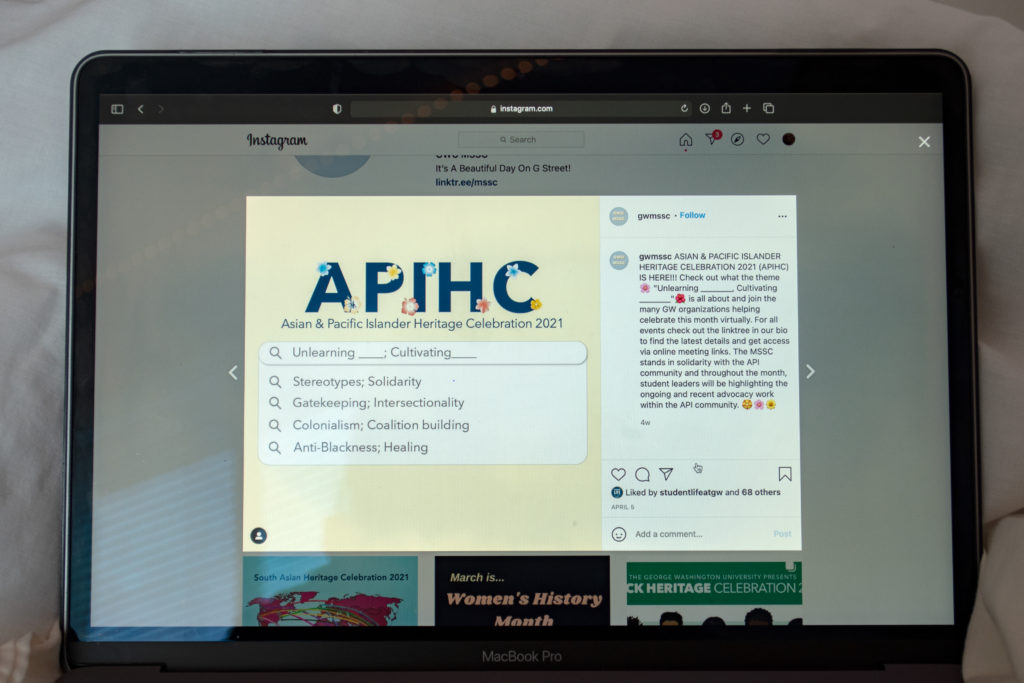This year’s virtual Asian and Pacific Islander Heritage Celebration turned its focus to highlight ongoing advocacy work after a recent rise in hate crimes against Asian Americans nationwide.
The Multicultural Student Services Center and supporting organizations hosted the annual programming itinerary last month, with events that ranged from hula basics to supporting small businesses. In light of the rise in hate crimes, organizers said this year’s theme, “Unlearning _____: Cultivating ______,” was especially timely to empower others to become advocates, uplift APIA voices and help students unlearn racism and microaggressions.
Senior Grace Bautista, who serves as the Asian American Student Association historian, said the group helped plan the theme and programming for the celebration, which ended the first year of full online activity after years of in-person culture shows and guest lecturers.
“We’ve talked a lot this year about, obviously, anti-Asian violence, but we’ve also had a lot of discussions about building solidarity with the Black community, what allyship looks like and unlearning anti-Blackness in our community,” Bautista said.
The celebration, founded at GW in 2004 , allows students to recognize Asian-Pacific American Heritage Month – officially designated for May – before the academic year ends.
Bautista said hosting the celebration virtually has been an “interesting” change, especially since the APIHC had only a smaller online event with difficulties using Zoom in the early days of the pandemic. She said attendance for the online events this year resembled or improved upon their past in-person events and the virtual keynote speeches peaked at roughly 115 attendees.
“I think it’s a lot easier to get people to come to something if it’s just kind of low stakes like click on a link,” she said. “You don’t actually have to go anywhere and physically show up.”
Bautista said the AASA also held a small event focused on community organizing and senior reflections, designed for younger students in the organization to learn from seniors’ experiences as they look to take on leadership roles within the organization in the future.
“I got to talk about my experience and what I’ve learned, and I think that that is a really important understanding to have and an important discussion to have, especially with the younger generation of students who are kind of taking the helm,” she said. “They’re going to be the ones that are deciding what APIHC looks like, what the org looks like.”
Renea Williams – the MSSC, API and South Asian program coordinator and a presidential fellow – said the MSSC began planning for the celebration at the end of the last fall semester.
“Student organizations have control over the programming they want to contribute to APIHC and, within the committee, discuss opportunities for collaboration between organizations within the APIA community and ensure there is not too much overlap in event types and themes in order to showcase the diversity of the APIA community on campus,” she said in an email.
Williams said experiential learning for GW students through cultural programming serves as one of the most effective teaching tools for young people, as they can prioritize connecting with different communities. She said she hopes that as with all heritage celebrations, the APIHC will encourage collaboration within the GW community and promote cultural awareness.
“During this tumultuous, harrowing time in our nation, it is even more important to uplift API voices and foster a space for community-led advocacy that empowers individuals across cultures to be allies and advocates,” Williams said in an email. “Through APIHC events we hope to unite people, bring awareness to APIA cultures and cultivate inclusive communities through solidarity, intersectionality, coalition building and healing together.”
Fred Flores, the vice president of the Philippine Cultural Society, said his organization ran its annual celebration of Tandaan, a culture show including a play and dances, for APIHC. He said PCS usually puts on a play centered around a common narrative among Filipinos in the United States, but this year the show was performed by members from separate locations on Zoom, which was recorded and later posted on YouTube.
“It’s probably our biggest event of the year,” Flores said. “I would say we would practice virtually the whole semester. We do a lot of rehearsals for that show, and there’s a lot of technical work and writing.”
This year’s play focused on rising numbers of Asian American representation in Hollywood, which is valuable but not “all encompassing,” he said.
“All our problems will go away if we were more Hollywood, which arguably, that’s not the end-all kind of solution,” Flores said. “And then I think our story was kind of making that realization that I think that kind of representation was important, but it’s not like the all-encompassing thing that’s going to guide Congress and the Asian American community.”
Sophomore Kariann Tan, the culture coordinator for the PCS, said she is responsible for organizing events that coincide with other Asian American communities at GW. She said she hopes the theme will help students take steps to unlearn racist microaggressions in light of recent tragedies against the Asian community, including the series of shootings in Atlanta that killed eight people, including six women of Asian descent, in March.
“There is a lot more learning to go, so to have an event that is made by students, for students to learn different ways of unlearning racism or on learning microaggressions – I think that’s very interesting,” Tan said.
Tan said asking questions serves as the best way to learn about the community and its events.
“Sometimes there’s a difference between incessantly asking someone or asking an Asian for information about what they should already know or learn themselves,” Tan said. “But asking is a good way to learn more about the event and learn more about unlearning itself.”








